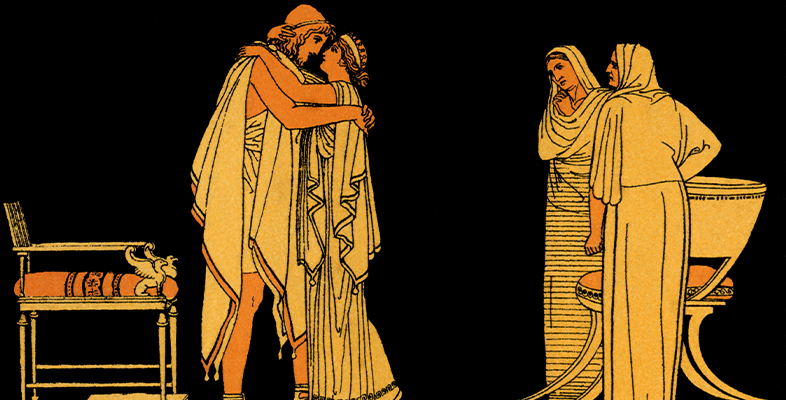4.2 Odysseus in disguise
At the opening of Book 23, Penelope has no idea yet what has happened in her absence. She first receives the news that the disguised man is Odysseus, and that he has killed the suitors, from the elderly nurse Eurycleia. As you’ll learn in the activities which follow, she still has a hard time believing that this is really her husband, and that he has finally returned home after such a long time away.
Activity 7
Read the extract below (Odyssey 23.88–110), which describes the moment when Penelope first goes to see Odysseus after she has learned that the man she thought was a stranger is really her husband. You don’t need to make any notes just yet, but notice as you read that we are given three different perspectives on Penelope’s reaction – one from the point of view of the poet (lines 93–95), one in the words of Telemachus (lines 97–103) and one in Penelope’s own words (lines 105–110).
When she [Penelope] had crossed the stone threshold and entered the hall,
she sat down in the brightness of the fire facing Odysseus,
by the wall opposite him. He was sitting leaning against a tall [90]
pillar, eyes cast down, waiting to see if his handsome wife
would have anything to say to him when she set eyes on him.
But for a long time she sat in silence, bafflement in her heart;
sometimes when she looked for him in the face she saw a likeness,
but then could not recognize him in the foul clothes he wore. [95]
Telemachus rebuked his mother, speaking directly to her:
‘Mother—my hard mother, with an unbending heart in you!
How can you turn away from my father like this? Why not
sit beside him, ask him questions and find out about him?
No other woman would have had the stubbornness of spirit to [100]
stay away from her husband, when after much hard suffering
he has returned to her in the twentieth year, back to his native land.
But your heart has always been more unyielding than a rock.’
Then in turn circumspect Penelope addressed him:
‘My child, the heart in my breast is dumbfounded; [105]
I cannot say a single word to him, or ask him a question,
or look him full in the face. If he really is Odysseus, and
has come back to his house, we two have better ways to
recognize each other with certainty; we have shared tokens,
which we alone know, and which are hidden from others.’ [110]
Now reread the passage, and this time fill in the table below. In the first column write some adjectives or short phrases of your own to describe how Penelope is characterised from each of the three different perspectives mentioned above; then in the second column make a note of the words in the text (with their line numbers) which create this impression. You can fill in more than one line for each if you wish. The first line has been filled in for you as an example.
| Whose perspective? | How is Penelope characterised? | Supporting evidence from the text |
| The poet (lines 93–93) | confused | ‘bafflement in her heart’ (line 93) |
| Telemachus (lines 97–103) | ||
| Penelope herself (lines 105–110) | ||
Comment
Here is an example of a completed table. Don’t worry if you picked out different parts of the text or used different descriptions, however – what’s important is that you used your own words to summarise what we can learn about Penelope from the extract you read.
| Whose perspective? | How is Penelope characterised? | Supporting evidence from the text |
| The poet (lines 93–93) | confused | ‘bafflement in her heart’ (line 93) |
| stunned | ‘she sat in silence’ (line 93) | |
| unsure that this is really Odysseus | ‘sometimes when she looked at him she saw a likeness, / but then could not recognize him’ (lines 94-95) | |
| Telemachus (lines 97–103) | harsh or cruel | ‘hard’, ‘unbending heart’ (line 97), ‘your heart has always been more unyielding than a rock’ (line 103) |
| obstinate | ‘stubbornness of spirit’ (line 100) | |
| Penelope herself (lines 105–110) | stunned | ‘the heart in my breast is dumbfounded’ (105) |
| nervous | ‘I cannot say a single word to him…or look him full in the face’ (lines 106–107) | |
| wants to be certain who he is before she approaches him | ‘If he really is Odysseus…we two have better ways to recognize each other’ (lines 108–109) |
You may have found it particularly interesting here that Telemachus’ impression of his mother’s character is very different from the explanation which she gives of her own state of mind. Telemachus seems to have misread the situation. Where her son judges Penelope harshly, surmising that she is being stubborn or cruel by refusing to approach Odysseus, her own words suggest something quite different. It seems from what she says here that her reluctance to speak to Odysseus comes from a deep uncertainty that this man is who he says he is. She has good reason to doubt the truth; not only does his disguise make him difficult to recognise but, as you may remember from my earlier discussion, he has already deceived her once by pretending to be someone else. You may also have noticed that Penelope is once again described as ‘circumspect’ here, in line 104. The description is particularly appropriate given how cautious she is being about approaching Odysseus. Elsewhere in the poem she also reveals that she has been tricked before by strangers telling false tales of her husband (14.126–130).
